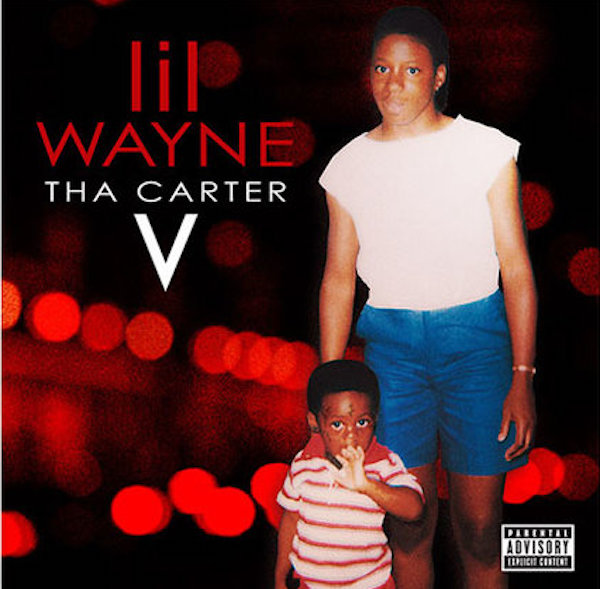How can the reality of something ever live up to the legend? Lil Wayne’s Tha Carter V—released on Friday after a half-decade of gestation—spent so much of its history being whispered about, delayed, delayed again, and maybe even cancelled that at times it seemed just as likely to end up a myth than an actual tangible thing. And for a while, it seemed better that way.
This decade has been an inconsistent one for the man who once rightfully never let you forget that he was the best rapper alive. Since his 2008 breakthrough Tha Carter III solidified him as an all-time pop star, Wayne has not since released a full project that reached the same highs critically or commercially. While he’s made the most of guest features and found a way to stay relevant through scattered songs, it has been a mostly uninspired period, and that’s to say nothing of his personal demons, which include being imprisoned in Rikers Island, near-death incidents, and the one thing no one really saw coming: his divorce from Cash Money records and his father figure Bryan “Birdman” Williams.
In some ways, there was a lot for Tha Carter V to live up to. But in other ways, its legend has existed on borrowed affection. The difference between this and, say, Dr. Dre’s Detox or Guns n Roses’ Chinese Democracy probably owes more to the sympathies and endearment garnered by Wayne over the years than any genuine belief that it could be great. Wayne himself has shown truly bright moments sporadically over the last handful of years, with memorable and intense guest appearances on albums by artists like Chance the Rapper and Solange. The latter, in particular, saw Wayne at his most introspective and vulnerable, a touching reminder that he was always more than clever punchlines.
With the arrival of Carter V coming amid that deluge of goodwill, what we have is an album that’s mostly pretty good. It’s certainly an improvement over Tha Carter IV—likely his least memorable album ever—but it’s also not a record that is going to reignite a second peak from Wayne, if that was the hope. Really, it feels sort of like what it is: the best version of the fourth sequel in a series. Things get off to a rocky start with the bizarre, ghastly XXXTentacion collaboration “Don’t Cry” before settling into a sturdy groove and not delineating too much. At its best, Tha Carter V is charmingly retro, creating songs that range from pop (“Dark Side of The Moon”) to R&B (“What About Me”) to more hard rapping (“Open Letter”) to party rapping (“Start This Shit Off Right”).
As hard as the past decade or so has been for Wayne, he has never been a quitter. His insane work ethic is as lionized as his skill, and Tha Carter V acts as a testimonial to that. It is Lil Wayne’s own personal celebration of Lil Wayne. “Give me some time, man, I am the bomb, man / I am gon’ swim til I come out on dry land or on the frying pan,” he quips on “Dedicate.” There’s an almost Oprah-like self-belief all over Carter V (“You cannot break down what can’t be broken / out of all the wrinkles, I was chosen,” goes the chorus of “Can’t Be Broken”), but it exists alongside a state of paranoia and exasperation that is more akin to Tupac: “Sometimes I fear who in the mirror, that nigga weird,” he raps on “Open Letter.” “He done died so many times but still here / Why am I here?” It’s fair to wonder how nearly eight years of pent up thoughts might manifest itself on record, and indeed Tha Carter V is overstuffed with everything one could possibly feel, but it also never feels unfocused.
For Kanye West, Travis Scott, Drake or younger generation stars like Post Malone or Lil Uzi Vert, songs are often first driven by the beat. Wayne, though, has rarely been interested in sharing the spotlight, for better or worse, and seems even less so here. That means Tha Carter V lives and dies based on Wayne’s performance. He is mostly up for the challenge, though, potent, exuberant, weird, and totally in control. He’s funny and charming one moment and a violent terror the next. He’s an effective crooner on “What About Me” and full of spacey, off-kilter rhymes on “Let it Fly.” On one of the album standouts, “Mona Lisa,” he goes toe to toe with Kendrick Lamar and gives him a real run for his money.
Still, the downside of this arrangement is that most of the beats sound a bit staid and unmemorable. Some even feel as though they’ve been in the vault since Tha Carter V was first supposed to come out in 2011. It’s on Wayne to make the worst tracks better, either through introspection (“I’m never alone / I got my demons and my angels / Can’t talk to myself, ’cause mama said don’t talk to strangers” on “Famous”) or pure skillful mastery of rhyming (“Uproar”). In a sense, Tha Carter V is similar to something like Martin Scorsese’s’ The Departed, which was criticized for almost being karaoke of all of his prior work. But that’s also what many people may have come to love about the movie, thinking of the film as a greatest hits collection, with all of Scorsese’s signature moves under one umbrella. Tha Carter V could almost be thought of in that same vein.
Regardless, Lil Wayne has had one of the most fascinating careers in music. That history is a heavy part of Tha Carter V both literally and figuratively. Where Wayne goes from here is hard to know, but it’s clear that he feels reinvigorated. It feels strange to say the fifth series in Tha Carter coming 20 years into an artist’s’ career may be a sign of things to come, but it’s also hard not to feel that even better music could still be on the way. Wayne has fought through everything including death to get to this album, and he long ago had nothing left to prove. But knowing Lil Wayne, he may prove even more just yet.





